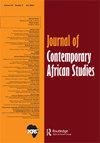解决加纳资源利用冲突:先锋行动和牛腿行动的案例
IF 0.8
Q2 AREA STUDIES
引用次数: 4
摘要
加纳拥有丰富的自然资源,包括森林、矿产、水和牧场,为国家发展作出了重大贡献。与此同时,对这些资源的竞争需求造成了许多已证明难以管理的冲突。本文旨在进一步了解加纳与资源利用相关的挑战,特别是冲突的性质和两项军警联合行动下的冲突解决机制:牛腿行动(Operation Cow Leg),该行动处理富拉尼牧民与当地农民之间围绕放牧权的长期冲突;以及“先锋行动”(Operation Vanguard),该行动旨在解决政府与参与非法小规模采矿(即galamsey)的人之间的冲突。根据有关国际维和的文献,并使用通过定性方法收集的数据,本文认为,虽然像“牛腿”和“先锋”这样的军警联合行动是必要的,但它们的实施未能让当地人民参与进来,并且对当地冲突遵循传统解决过程的方式关注不足。本文章由计算机程序翻译,如有差异,请以英文原文为准。
Addressing Conflicts over Resource Use in Ghana: The case of Operations Vanguard and Cow Leg
Ghana is endowed with natural resources including forests, minerals, water and grazing lands which have made significant contributions to national development. At the same time, competing demands for these resources have created many conflicts that have proven difficult to manage. This paper seeks to further understand the challenges associated with resource use in Ghana, in particular the nature of conflicts and conflict resolution mechanisms under two joint police-military operations: Operation Cow Leg, which deals with long-running conflicts between Fulani herdsmen and local farmers over grazing rights; and Operation Vanguard, which addresses conflicts between the state and those involved in illegal small-scale mining popularly known as galamsey. Drawing on the literature on international peacekeeping, and using data collected via qualitative methods, the paper argues that while joint police-miliary operations such as Cow Leg and Vanguard are necessary, their implementation has failed to involve local people, and paid insufficient attention to the ways that local conflicts follow traditional processes of resolution.
求助全文
通过发布文献求助,成功后即可免费获取论文全文。
去求助
来源期刊

Journal of Contemporary African Studies
AREA STUDIES-
CiteScore
2.20
自引率
0.00%
发文量
18
期刊介绍:
Journal of Contemporary African Studies (JCAS) is an interdisciplinary journal seeking to promote an African-centred scholarly understanding of societies on the continent and their location within the global political economy. Its scope extends across a wide range of social science and humanities disciplines with topics covered including, but not limited to, culture, development, education, environmental questions, gender, government, labour, land, leadership, political economy politics, social movements, sociology of knowledge and welfare. JCAS welcomes contributions reviewing general trends in the academic literature with a specific focus on debates and developments in Africa as part of a broader aim of contributing towards the development of viable communities of African scholarship. The journal publishes original research articles, book reviews, notes from the field, debates, research reports and occasional review essays. It also publishes special issues and welcomes proposals for new topics. JCAS is published four times a year, in January, April, July and October.
 求助内容:
求助内容: 应助结果提醒方式:
应助结果提醒方式:


